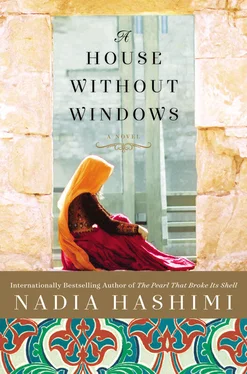Go, Zeba had screamed at her, half expecting Kamal to rise from the dead and strike them both down. She’d faltered, staring at her bloodied hands, before frantically wiping them on her dress.
No, no, no, no, no, the girl had cried in a voice so small Zeba could barely hear it over her own thunderous heartbeat.
Little girl, she thought as she stood inches away from her mother and thought of how many women kept secrets in the vault of their hearts. Just a little girl and already so much to hide.
YUSUF TRUDGED ALONG THE ROAD, HIS SHOES MUDDIED AND his socks damp. He’d rolled up the hems of his trousers, hoping to spare at least part of his clothing from the mud. The taxi driver had dropped him off as close to the entrance of Chil Mahtab as he could.
He should not have come today. There was no true urgency to this visit, nothing he was going to do that could not have been done tomorrow when the sun had been given the opportunity to dry the streets. Yusuf told himself that engaging with this reporter was strategy, not an act of desperation. He stood in the interview room while two guards rambled past, greeting him with a nod. He’d gotten to know their faces, if not their names, and put a hand to his forehead in a friendly salute before unfurling his trouser legs.
He checked his phone and saw that it was just a few moments after two o’clock. He opened his messenger bag and removed his notepad. He spotted his bottle of eyedrops and appreciated the rain for what it did to the air quality. He’d woken that morning without feeling like the insides of his eyelids were made of sandpaper.
He’d missed a call. He looked at the long string of numbers and realized his mother must have called with a calling card. She purchased them from the Afghan market she went to for bread, lamb, and thermoses, items she refused to purchase from any other retailer. She took two buses and walked a quarter of a mile to get to the Afghan store but never complained about the inconvenience.
Everywhere else you go, she would say, they give you beef and call it lamb. They think people won’t know any better. And these thermoses know how to keep tea hot for hours!
You think your fellow countrymen are above cheating you? his father would retort with eyes still trained on the television set. They just speak your language while they’re doing it. We haven’t had real lamb in years .
The longer Yusuf stayed away, the more he found himself imagining what his parents might be doing at any given moment. On his phone, he switched between local time and New York time. It wasn’t that he wanted to be back in their apartment with the wafting smells of the neighbors’ cooking and rattle of air-conditioning units perched precariously on windowsills. It was more that he thought of his parents with a certain fondness. Nostalgia, he thought, was far more elegant than homesickness.
He would call his mother tonight, when it would be noon in New York and she would be home, cooking lunch for his father. She was, doubtless, delivering daily packages of food to his sister as well to keep her well nourished as she thickened with her growing baby.
“Have you been waiting long?”
Her voice startled him. Yusuf looked up and found himself staring into the kohl-rimmed eyes of a woman who had to be Sultana. She wore a knee-length army green jacket, with sleeves rolled at the cuffs. She had on slim-fitting jeans tucked into brown boots, smart wear for the day’s conditions. She stuck out her hand and tilted her head to the side.
“You are Yusuf, aren’t you?”
“I am,” he said and pushed his chair back to stand. He shook her hand, surprised both that she’d offered it and that her grip was as firm as it was.
“Sultana- jan, I’m assuming,” he said, pointing to the chair across from his. He waited as she put her shoulder bag on the ground and flipped her brown cotton head scarf off her head, fluffed the top of her hair, and let it fall lightly back into place. She smiled politely, small dimples appearing at the corners of her mouth like apostrophes. She had no other makeup on her face and not a single piece of jewelry.
“Correct,” she confirmed. “Thanks for meeting me.”
“Of course,” Yusuf replied. It was inherently uncomfortable for the two of them to be seated in a room — alone. It didn’t help matters that Yusuf felt stirred by her face, the way her cheeks tapered to give her a heart-shaped countenance. “I’m glad you’re looking into this place, actually. When you start looking into the cases of these prisoners, it tells you a lot about where the justice system’s priorities are.”
“Exactly,” Sultana agreed. “When we need the police, they throw their hands up and cry ‘what can we do without funding or training?’ It’s amazing how capable and resourceful they are in finding a woman who’s escaped from a deadly home. No criminal is worse than a woman who wants to live for herself.”
“It must be hard to report on this as a woman,” Yusuf commented. “Frustrating to watch this happen.”
“I suppose so. It’s not shocking, of course. Just a reminder of how things really are. I could easily be them, I think. Other women might choose to believe differently, but any one of us could end up here.”
Yusuf thought of the cases he’d reviewed with Aneesa: the woman who had strangled her husband after he’d prostituted her to strangers for money; the woman who had left the husband who had tried to stab her with a screwdriver; the woman who had refused to marry the man thirty years her senior. Yusuf thought of his own sister, who had dared to fall in love with a man his parents did not like. They’d shouted and protested, but in the end, it was her choice and they’d paid for her wedding and smiled when their friends congratulated them, never revealing how disappointed they’d been.
His sister could have been on the roll call of Chil Mahtab, Asma the guard watching over her and Qazi Najeeb deciding her fate over a cup of green tea. That was why Yusuf was here — because he could imagine his family or himself in every tragedy in this land. He could have been the ill-trained prosecutor, incapable of framing a true legal argument. His sister could have been locked up here. His brother could have been arrested for being caught with his girlfriend. Hell, Yusuf could have been arrested for the same. Even his parents could have been arrested for some conflagration of the truth.
“What kind of article are you trying to put together, exactly?” Yusuf asked.
“I want to talk about the specific crimes and the way women are locked up without a second thought. The problem is that none of the women want their names or faces in the news. They’d be happier talking to foreign press about it, but the thought of their stories anywhere in the Afghan news makes them want to run and hide. Of course, it’s impossible to get the judges or the police to talk about any of this. They’re all doing the right thing, in their own minds.”
“I don’t think Zeba’s going to want to talk either, to tell you the truth,” Yusuf admitted. “She’s got children she’s thinking about and doesn’t want her name smeared any more than it already has been.”
“I’m sure. That’s why I’m not really talking about highlighting any particular case. I’d rather make it about the system as a whole.”
“You know, I never asked you,” Yusuf mused. “Why did you call me? I mean, there are a lot of lawyers with much more local experience here.”
“Good question,” Sultana said, laying her hands on the table as if to come clean. “I’ve been asking around and it’s pretty hard to get anyone to talk. The attorneys who have trained here don’t want to speak to a journalist, especially a female journalist. I thought you might be different. Plus, Zeba’s case is fascinating. There aren’t many murder cases, but in the few I’ve come across, the motivation is pretty clear. The women offer up exactly what it is that drove them to kill. She’s not really given any kind of reason and”—Sultana’s pointer fingers rapped on the table in synchrony—“I’m sure she must have had one. The fact that she won’t reveal it only makes me more curious.”
Читать дальше











